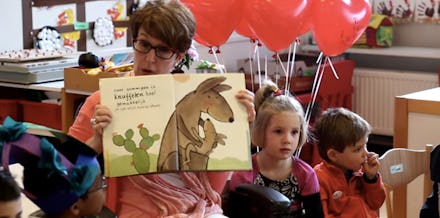With Sex Ed Starting in Preschool, Here's the Sex-Hellscape the Netherlands Has Become

A teacher in the Netherlands holds up a picture book to her kindergarten class. In the book is a mother kangaroo with her baby.
"What are they doing in the pictures," she asks? "Hugging," a student responds. Turning to look at the speaker, she continues, "and when do you hug someone?" "If you love someone," says a girl on her left. "What else can you do if you love somebody?" the teacher goes on. "Get married," says another student.
This is how sex education starts in the Netherlands.
Sex education, or more accurately sexuality education, begins at the earliest levels of schooling in the Netherlands. According to a PBS NewsHour report, Dutch law requires students receive some form of sexual education from kindergarten, typically continuing into secondary school.
In the beginning, sex goes unmentioned, but things steadily progress as students get older. By age 7, students are expected to be able to know and name male and female genitalia, and by 11, they can navigate a broad range of discussions ranging from unwanted sexual advances to how to handle erections.
"People often think we are starting right away to talk about sexual intercourse [with kindergartners]," Ineke van der Vlugt, an expert on youth sexual development, told PBS NewsHour. "Sexuality is so much more than that. It's also about self image, developing your own identity, gender roles, and it's about learning to express yourself, your wishes and your boundaries."
Far from detailed descriptions of female condom use during anal sex, and other nightmare conservative fantasies, initial lessons focus more on exploring the more fundamental relations between people. More complex issues like contraceptive use and gender identity come later.
The Dutch approach contrasts sharply with a U.S. system that's much more restrictive in content and scope to such an extent that Doug Beaudoin, a former English high school teacher in Bismarck, North Dakota, described it as "puritanical."
"One of the big issues that flabbergasts Americans is sexuality," Beaudoin told Mic. "Our society is not very open to that." Beaudoin said he had been fired from teaching at one North Dakota high school for saying "wet dream" during a discussion of Arthur Miller's The Crucible.
"It doesn't do any service to hide the truth from anybody," said Beaudoin, who adds that religion creates what he said was a destructive "we can't go there" attitude to sex education and children.
In the U.S. sex education varies widely, with fewer than half of the states even requiring it, the Guttmacher institute reports. Where it is taught, curriculums run the gauntlet from highly progressive to rigid abstinence-only education.
Far from young people running wild in sexual madness, however, the increased focus on body awareness promoted in the Netherlands has resulted in one of the lowest teen pregnancy rates in the world, roughly 1/5th that of the United States, according to the World Bank. The U.S. states that push abstinence-only sex education, on the other hand, have the highest rates of teen pregnancy in the country. Studies have shown early sex education can reduce the risk of maternal death, unsafe abortions and contracting an STD. Added to that, Beaudoin said, children would have the tools necessary to identify pedophilia and speak out.
American trepidation toward sex education is an outdated relic discredited both by scientific studies and the real-life experiences of other countries. Rather than a false choice between abstinence and the detailed mechanics of anal sex, the Dutch model reveals that true sex education can be an enlightening and gradual experience and with genuine value for all ages.
Updated June 4, 3:27 p.m.:
An earlier version of this article cited PBS, rather than PBS NewsHour, as having reported on the Dutch kindergarten classroom.